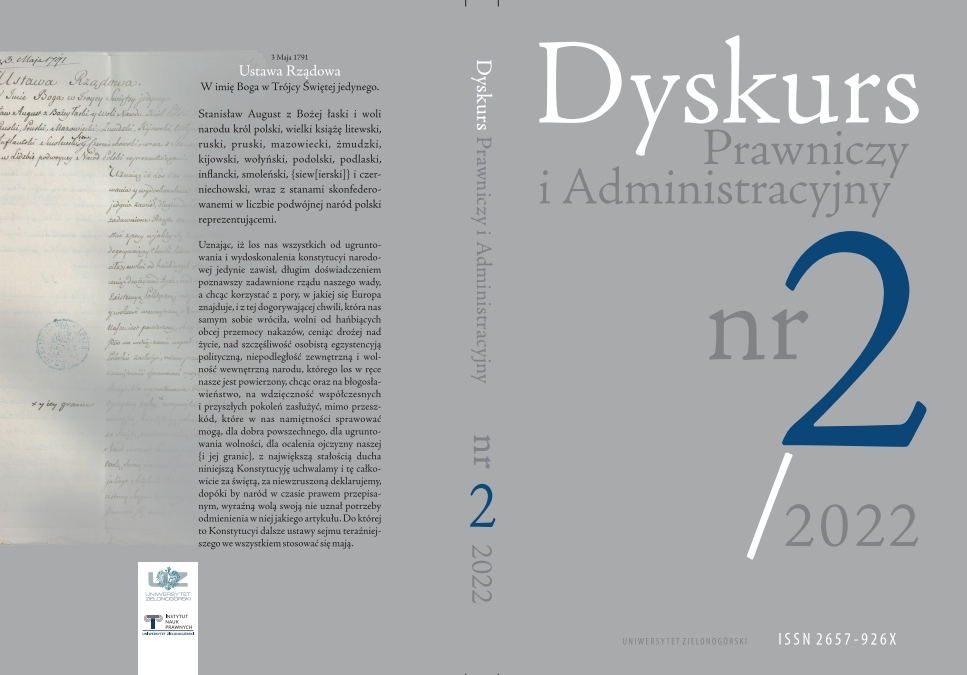Tax audit in the Polish Deal programme
Keywords:
tax audit, Polish Deal, verification purchase, temporary seizure of movable propertyAbstract
The Polish Deal (Polski Ład) is a government programme effective from the beginning
of 2022. It is supposed to help to recover from the economic crisis Poland found itself in after the
pandemic. It provides for changes in tax law. In addition to tax changes, it is intended to help solve
housing problems. It also applies to healthcare, retirement and disability pensions, economic activity,
social security, and, to a certain extent, labour law. The Polish Deal did not introduce changes
to the tax audit, although this had been planned. Tax audit is still regulated primarily by the provisions
of the Tax Ordinance and the Law of Entrepreneurs. It is conducted ex officio and is designed
to check the application of tax laws by those being audited. A novelty in the tax legislation is a verification
purchase, relating to the purchase of goods and services using a cash register. Additionally,
temporary seizure of movable property was added to the National Tax Administration Act. It consists
in the ability to seize the movable property of a taxpayer who is in arrears with payments to the
tax authorities. This is done for a period of 96 hours. The enforcement authority may confirm the
seizure or waive it. There are no direct provisions in the Polish Deal that would regulate tax audits.
Several new approaches to the audit can be proposed in this regard. We may add to the regulations
a request for a tax audit at the demand of the auditee, or provisions permitting an audited entity to
request a selected audit activity, or a proposal to limit duration or number of audits at a taxpayers.
The author proposes that one audit may be conducted once every five years at a given entity. A good
solution in the first years of the Polish Deal may also be to apply lower penalties for mistakes in interpreting
its provisions.
References
Antonów D., Bieńkowska A., Grzegorczyk T. et al., Meritum. Podatki 2022, Warszawa 2022.
Babiarz S., Dauter B., Gruszczyński B. et al., Ordynacja podatkowa. Komentarz, Warszawa 2009.
Bartosiewicz A., Polski Ład. Podatki i składki, Warszawa 2022.
Dzwonkowski H. (ed.), Ordynacja podatkowa. Komentarz, Warszawa 2019.
Dzwonkowski H., Huchla A., Kosikowski C., Ustawa Ordynacja podatkowa. Komentarz, Warszawa 2000.
Górczak M., Kontrola podatkowa, https://www.zakiewicz-adwokaci.pl/prawo/kontrola-podatkowa.html.
Jagielski J., Kontrola administracji publicznej, Warszawa 2007.
Podręcznik Reforma Polski Ład, Polish Ministry of Finance, legal status as on 7 February 2022.
Poradnik Przedsiębiorcy, Kontrola podatkowa i skarbowa – porównanie procedur, https://poradnikprzedsiebiorcy.pl/-kontrola-podatkowa-i-skarbowa.
Szulc M. , Fiskus przestał strzelać na oślep. Urzędnicy kontrolują dużo rzadziej, ale za to efektywniej, „Dziennik Gazeta Prawna”, http://podatki.gazetaprawna.pl/artykuly/1107626,efekt-krajowej-administracji-skarbowej-mniej-kontroli.html.
Published
How to Cite
Issue
Section
Copyright (c) 2023 Magdalena Kowalczyk

This work is licensed under a Creative Commons Attribution-NonCommercial-NoDerivatives 4.0 International License.





